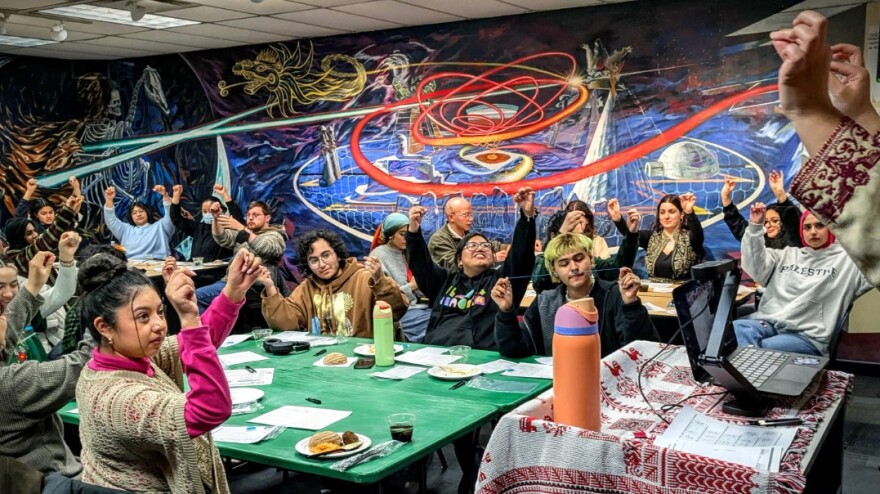On Monday night at the University of Illinois Chicago’s Latino Cultural Center, two dozen students sat hunched over small squares of fabric with needles and thread in hand, learning a type of Palestinian embroidery called tatreez.
Lana Oliveros, a senior at UIC, found time for the workshop between her three jobs and her classes because she needed a break from the world, she said, and she was curious to learn about another culture.
“With how difficult it has been the last couple of weeks, I think it’s good to be in community and to learn about indigenous arts and to preserve them, because these things are getting lost,” Oliveros said.
Students and faculty have fought for years to establish the Latino center and other cultural centers like it at UIC and at campuses across Illinois, to provide spaces for students to celebrate and learn about one another’s differences.
Now, students and faculty worry the second Trump administration could mean the end of these spaces.

In a letter issued on Feb. 14, the U.S. Department of Education threatened to pull federal funding from schools that, in any way, differentiate students based on race, claiming such efforts are discriminatory.
Experts say that could be interpreted to mean campuses are not allowed to offer any kind of programming for diverse groups of students, including scholarships, or graduation ceremonies for students of color — or cultural centers.
“It’s absurd,” said Paulette Granberry Russell, president of the National Association of Diversity Officers in Higher Education. “Diversity just is … and it’s not going to change. This country will never be a country of one race. That wasn’t its origins, it’s not its [present] and it will not be its future.”
The letter from the Education Department notes that its guidance “does not have the force and effect of law.” Still, Granberry Russell worries universities will rush to roll back programs, especially because the letter outlines a 14-day window for compliance.
“When an agency under the authority of the president of the United States issues that kind of dicta, not only does it have a chilling effect, it is provoking institutions to determine that there’s nothing more that we can do to support diversity on our campuses, because it has been deemed unlawful,” Granberry Russell said.
Granberry Russell’s group has signed onto a lawsuit to block two of President Trump’s executive orders that take aim at diversity, equity and inclusion efforts in higher education.
In the meantime, she and other higher education experts are urging schools not to roll over.
“Universities play a key role in stepping up and saying, ‘No, we’re not going to accept this,’ ” said Chenjerai Kumanyika, who sits on the national council of the American Association of University Professors. “‘We’re not going to accept or act on anything that’s not even legal yet. And then, even if you’re trying to make turning back civil rights legal, we’re not going to accept that.’”
UIC, Northwestern University and the University of Chicago refrained from commenting when asked how they are responding to the Education Department’s guidance — and if they plan to stand by their offerings for students of color and other groups.
“I’m not sure what will happen, and I hate to say that,” said Lana Oliveros, the UIC senior.
As a second-generation Filipino-American and working student, she has depended on UIC’s cultural centers to find a community on campus.
“I feel sometimes like, ‘Am I really a scholar? Do I deserve to be here?’ ” she said. “It’s difficult to take up space. But UIC’s cultural centers have helped me feel like I deserve to be here and to not be afraid — to be present and represent myself and the things that I stand for.”

